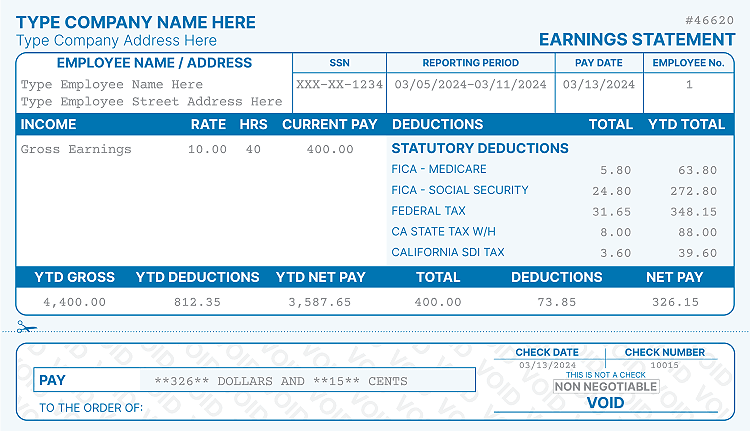How Are Tips Taxed on Paychecks? Reporting, Compliance, Examples and Forms

Tips received by employees are considered taxable income in the United States.
Both cash and non-cash tips must be reported as part of an employee’s earnings. This applies to electronic tips (e.g., credit card transactions) and cash tips above a certain threshold. Proper reporting ensures compliance with IRS regulations and protects employees' future benefits such as Social Security.
Below, we explore how tips are taxed, their reporting requirements, and key compliance details for both employees and employers.
How Are Tips Taxed?
Tips are treated as taxable income, which means they need to be included in your gross income, whether they're cash tips or tips added to credit card payments.
According to the Internal Revenue Service (IRS), all cash and non-cash tips received by an employee must be reported to their employer if they total more than $20 in a calendar month. Taxes are withheld from their paychecks accordingly.
Key Taxation Points:
- Federal Income Tax: All reported tips are taxable and included in gross income.
- Social Security and Medicare Tax: Reported tips are subject to a combined 7.65% for these taxes.
- Threshold for Reporting: Tips totaling less than $20 per month per employer are not required to be reported or taxed.
Reporting Tips: Employee Responsibilities
Employees are legally required to report all tips received, whether in cash or through a point-of-sale system. Failure to report tips may lead to penalties, both for employees and employers. The reporting process involves:
- Keep Daily Records: Use IRS Form 4070A,“Employee’s Daily Record of Tips “ to track all tips, including non-cash tips like tickets or other items of value.
- Report to Employers: Use IRS Form 4070, “Employee's Report of Tips to Employer,” by the 10th of each month for tips received (exceeding $20) in the prior month.
- Report All Tips on Tax Returns: Tips not reported to the employer must be included on individual tax returns using IRS Form 4137, “Social Security and Medicare Tax On Unreported Tip Income.”
Example: If a server earns $500 in tips during November, they must report this amount to their employer by December 10th.
Employer Obligations for Tip Reporting
Employers play a vital role in tip income compliance, including:
- Withholding Taxes: Employers are responsible for withholding income, Social Security, and Medicare taxes on reported tips.
- Filing Form 8027: Large food or beverage establishments must file this form annually to report receipts and tips.
- Allocating Tips: If employees report less than 8% of gross receipts in tips, employers must allocate the difference to employees, recorded in Box 8 on Form W-2.
Example: Tip Tax Calculation
A server earns $2,000 in wages and $500 in tips in a month.
- Gross Pay: $2,000 + $500 = $2500
- Taxes:
- Federal Income Tax: ~$300 (varies by tax bracket).
- Social Security Tax: $155 (6.2% of $2,500).
- Medicare Tax: $36.25 (1.45% of $2,500).
- Total Deduction: $300 + $155 + $36.25 = $491.75
- Net Pay after deductions (Gross Pay - Taxes) : $2500 - $491.75 = $2,008.75 .
Need to Know : How to Calculate Your Net Pay?
Why Are Tips Deducted From Paychecks?
Many employees notice that tips are deducted from their paychecks, leading to confusion. The primary reason is that employers use reported tips to calculate and withhold the appropriate taxes. By including tips in payroll, employers ensure they are protected from tax-related issues, such as audits or penalties for underreporting.
Employers must also pay their share of Social Security and Medicare taxes on these reported tips, making accurate tip reporting crucial for both employees and employers.
Are Tips Taxed Differently Than Wages?
While tips are considered income, they are taxed in a slightly different manner compared to regular wages:
- Wage Taxation: Employers withhold taxes directly from wages before issuing the paycheck.
- Tip Taxation: Taxes on tips are calculated based on the amount reported, and the withholding occurs during payroll processing.
According to IRS guidelines, both wages and tips must be included in your taxable income, but it is the employee's responsibility to report tips accurately to their employer.
FAQs on Taxable Tips
1. Are credit card tips taxed on paychecks?
Yes, credit card tips are taxed just like cash tips. They are included in your gross income, and appropriate taxes are withheld.
2. What is the tax rate on tips?
Tips are subject to federal income tax, Social Security, and Medicare. The specific rate depends on your overall income bracket, but Social Security and Medicare total 7.65%.
3. When did tips become taxable?
Tips have always been considered taxable income, but the IRS started enforcing stricter reporting requirements in the 1980s to ensure compliance.
4. Are cash tips taxable?
Yes, cash tips are taxable. Employees must report all cash tips exceeding $20 per month per employer.
5. Are tips subject to Social Security tax?
Yes, tips are subject to 6.2% Social Security tax and 1.45% Medicare tax. Employers are responsible for withholding these amounts from paychecks.
6. Do waitresses pay taxes on tips?
Yes, all employees in tipped positions must report and pay taxes on tips. These taxes are withheld from their paychecks.
7. What are allocated tips?
Allocated tips are amounts distributed by employers to meet the IRS’s 8% tip threshold. These are reported in Box 8 of Form W-2 but are not withheld for taxes unless additional reporting is required.
8. What happens if tips aren’t reported?
Unreported tips result in back taxes, interest, and penalties. Employees must also cover the employer’s share of Social Security and Medicare taxes for these tips.
9. Can an employer claim tips for you?
No, employers cannot claim tips as their own. However, they are required to allocate tips to meet IRS thresholds and include these amounts on employee W-2s.
Service Charges vs. Tips
Service charges, such as automatic gratuities, are not considered tips. They are treated as regular wages and are subject to tax withholding. For instance:
- A restaurant adds an 18% service charge for parties of six or more. This charge is non-voluntary and distributed to employees as wages, not tips.
Voluntary Tip Compliance Agreements
The IRS offers agreements such as TRAC (Tip Reporting Alternative Commitment) and TRDA (Tip Rate Determination Agreement) to simplify compliance. These agreements reduce audits by setting pre-determined tip rates for employers and employees in industries like restaurants and casinos.
Additional Medicare Tax on Tips
Employees earning over $200,000 annually (combined wages and tips) are subject to a 0.9% Additional Medicare Tax. This tax applies only to the employee and not the employer.
Conclusion
Accurate reporting of tips is essential for both employees and employers to remain compliant with IRS regulations. Employees must maintain daily tip records, report tips to their employers, and include all tip income on their tax returns. Employers are responsible for withholding taxes and ensuring proper allocation of tips. Adhering to these practices avoids penalties and secures future benefits like Social Securit
Kristen Larson is a payroll specialist with over 10 years of experience in the field. She received her Bachelor's degree in Business Administration from the University of Minnesota. Kristen has dedicated her career to helping organizations effectively manage their payroll processes with Real Check Stubs.

